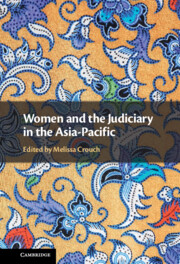‘Moving beyond demographic description, Crouch brings together crucial scholarship on the possibilities for thick feminism when the judiciary gets substantially (and sustainably) feminized. Using accounts across sites, this volume considers the structural conditions that realize and resist women's accession to these positions of power, as well as their complicated individual narratives of success while navigating these conditions. In doing so, it forces us to (re)consider the location of the global south and its actors in legal profession scholarship.'
Swethaa S. Ballakrishnen - University of California
‘While attention has been paid to the growing number of women lawyers in the United States of America, Canada, Australia and the United Kingdom, and individual judges like Ruth Bader Ginsburg have captured the attention of many non-lawyers around the globe, less is known about women lawyers in the Asia Pacific. Women and the Judiciary in the Asia-Pacific is a timely collection, making a significant contribution to ensuring efforts to overcome and address issues of inequality, discrimination and gender injustice are better understood. This book enables lawyers and legislators, public policy makers and comparative scholars to benefit from the excellent contributions in this collection, and better appreciate the active citizenship of women lawyers around the globe.’
Kim Rubenstein - Co-Director, 50/50 by 2030 Foundation, Faculty of Business, Government and Law, University of Canberra
‘This impressive collection considers a question that continues to challenge feminist legal scholars and practitioners: what role do women in the judiciary play in achieving gender equality? Applying this to a hitherto under-examined field – courts and the legal profession in the Asia-Pacific -it explores both the ‘promise and paradox' of the work of women judges. In its rich historical and contemporary accounts of multiple countries in the region, it offers a ‘thick' description of what the ‘feminisation of the judiciary' may mean, and in doing so will prove indispensable for scholars in the field and fascinating for general readers. Original and illuminating in both its subject matter and its perspective, it brings together a team of country specialists, under the editorship of one of the leading experts in the judicial systems of the Global South.'
Helen Irving - Professor Emerita, University of Sydney
‘Moving beyond demographic description, Crouch brings together crucial scholarship on the possibilities for thick feminism when the judiciary is substantially (and sustainably) feminized. Using accounts across eight locations, this volume considers the structural conditions that realize and resist women's accession to these positions of power, as well as their complicated individual narratives of success while navigating these conditions. In doing so, it forces us to (re)consider the location of the Global South and its actors in legal profession scholarship.'
Swethaa S. Ballakrishnen - Assistant Professor, University of California, Irvine
‘The book makes for a relevant and compelling read and constitutes a useful resource for policymakers and lawmakers in the region, as it draws on the experiences of Asia-Pacific. In fact, it opens up necessary debates, as it invites readers to consider the challenges of gender equality in the Global South, a region often overlooked in the prevailing literature. … The book is a must-read and truly inspires a move towards building a gender perspective.’
Ayesha Malik
Source: International Journal of Constitutional Law
‘… the book is an important milestone in carrying forward the conversation on gender and judging. It expands the current scholarship to Asia Pacific, while also bringing new dimensions to the field, particularly through the vastly diverse political context of the region.’
Surbhi Karwa
Source: International Journal of Constitutional Law
‘… [the book] cannot be more timely in analyzing what the contributors define as ‘the feminisation of the judiciary’. In this informative volume, the growing presence of women judges is reported and analyzed in the Pacific islands, Sri Lanka, Thailand, Indonesia, the Philippines, Malaysia, Nepal, and India.’
Wen-Chen Chang
Source: International Journal of Constitutional Law





